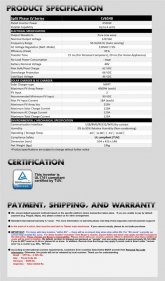I've been getting a lot of great help from people on this forum and I really appreciate it. Seems like the deeper I go into developing my system, the more confused I get. This will be for a fully off-grid 320 sqft cabin with 2 honda 2200i generators to charge batteries when needed and run an air conditioner during really hot nights.
Any advice any of you would have on this so far would be appreciated again.
So far planning:
MPPT LV6548 6.5KW – 120v Solar inverter 8kW -2 x 4kW 250V MPPT BMS
More thank likely make my own 48V LiFePO4 battery setup - maybe purchasing through Michael here
No decision on which solar panels yet
Was going to use a 24V refrigerator, but don't know if I should just go with a 120V regular fridge. Is it worth it to run a separate 12 or 24V line to the house just for the refrigerator?
Here is my energy audit and system size information with the refrigerator estimated at 1000 watts a day.
Am I heading in the right direction or have a screwed something up?? Thanks again, everyone!
Any advice any of you would have on this so far would be appreciated again.
So far planning:
MPPT LV6548 6.5KW – 120v Solar inverter 8kW -2 x 4kW 250V MPPT BMS
More thank likely make my own 48V LiFePO4 battery setup - maybe purchasing through Michael here
No decision on which solar panels yet
Was going to use a 24V refrigerator, but don't know if I should just go with a 120V regular fridge. Is it worth it to run a separate 12 or 24V line to the house just for the refrigerator?
Here is my energy audit and system size information with the refrigerator estimated at 1000 watts a day.
Am I heading in the right direction or have a screwed something up?? Thanks again, everyone!
| Minimum System size calculations | ||
| Full Load Wattage | 3203 | Watts |
| Full Load W-hrs. | 7822 | W-Hrs. |
| Full Surge wattage | 1075 | |
| Inverter efficiency | 96.00% | % |
| Full Load Inverter size (input watts) | 3336 | Watts |
| Full Surge load Inverter size | 44 | Watts |
| Daily Storage Requirement | 4000 | W-Hrs/Day |
| Max discharge from full CHARGE | 90.0% | % |
| # days of storage capacity | 1.0 | Days |
| System Voltage | 48.0 | Volts |
| min Battery capacity W-Hrs | 4444.4 | W-Hrs. |
| min Battery capacity A-Hrs | 185.2 | Amp Hours |
| Max continuous current from bat. | 69.5 | Amps |
| Max Continuous discharge rate | 0.38 | C |
| # sunny days to recharge while under load | 2.0 | Days |
| Required Total daily Solar output (Sunny) | 6000.0 | W-Hrs. |
| Insolation # (Equivelent hours of full sun) | 4.0 | Hours |
| Min Solar Cell Wattage | 1500.0 | Watts |
| Max Charge Current | 31.3 | Amps |
| Max Charge rate | 0.17 | C |



